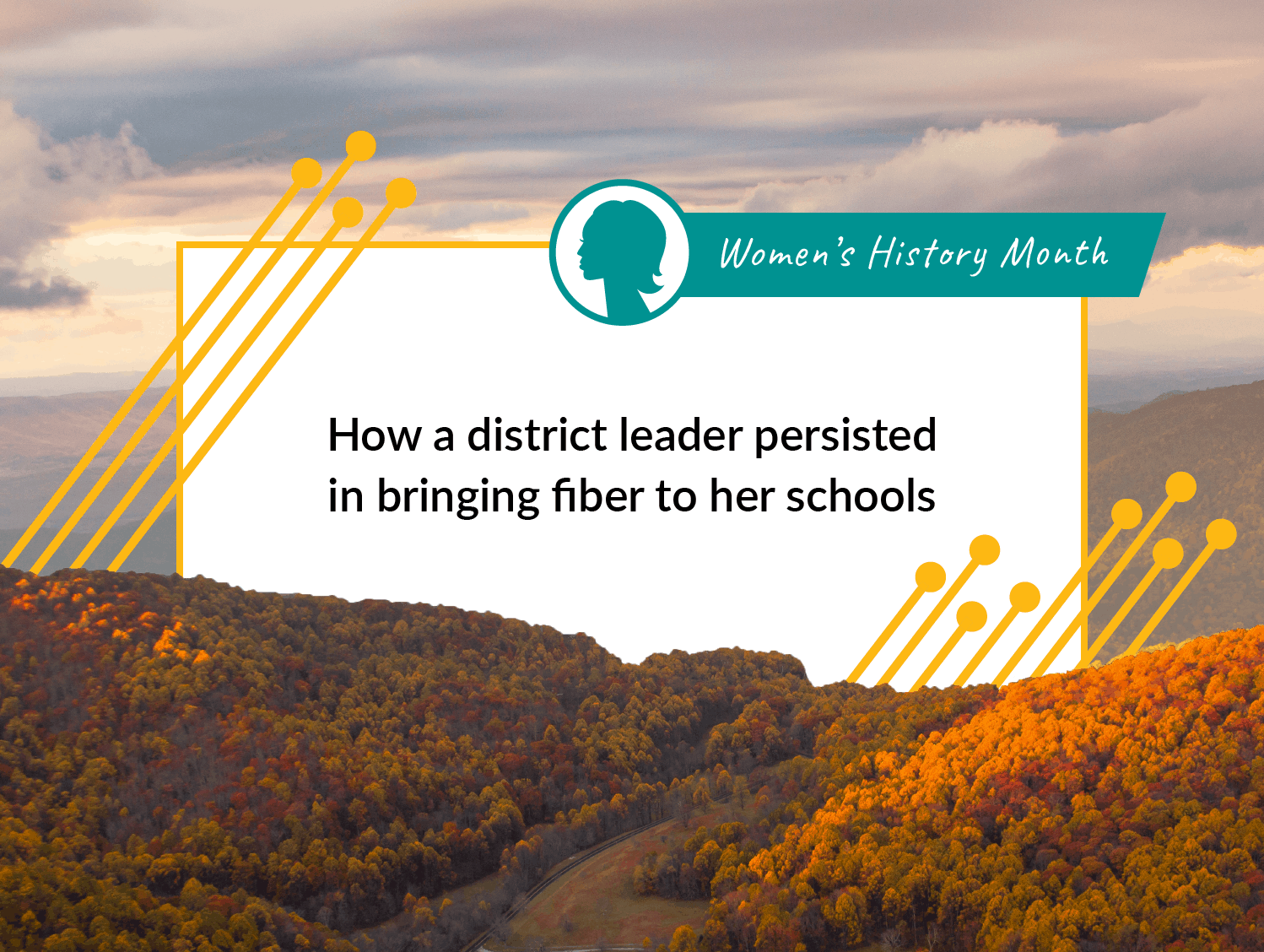Getting fiber infrastructure to a rural school district is no easy feat. It often takes piles of paperwork, hours of negotiations, and above all: patience and persistence.
In honor of Women’s History Month, we’re celebrating one persistent technology leader, Robin Bolt, who has made history at Rappahannock County Public Schools by bringing fiber connections to her rural school division in Washington, Virginia.
HER DISTRICT’S STORY
When our team at EducationSuperHighway first reached out to Robin, Rappahannock was one of only six school divisions in Virginia that lacked fiber infrastructure. Once we spoke with Robin, we immediately got a sense of how tricky terrain was a big challenge to their network upgrade.
“We really are in the middle of nowhere: we live in a very rural area in a very mountainous county near the Shenandoah national park. Our county doesn’t even have a stoplight in it. It’s very hard to get service out to our community when we can barely get cellular reception.”
However, Robin knew she had to find a way to improve her school division’s Internet access given the trouble they were having with their connectivity.
“In 2018, we were using 1980s technology and [the Internet] was in and out. We couldn’t download videos, and I even had to ask people to get offline during standardized testing so we wouldn’t bog down the network. It was a mess. I got constant complaints from students, teachers, and administrators. If it rained, we lost Internet connection. My hands were tied because it was cost prohibitive and we didn’t have anyone to provide these services.”
HER PATH FORWARD
After being introduced to EducationSuperHighway by Virginia’s K-12 Learning Infrastructure Program coordinator Susan Clair, Robin began to see a path forward.
“[EducationSuperHighway] showed me that there were service providers that were willing to come out here, so I was able to put out my E-rate Form 470 and get feedback. That was really the turning point, because your team put us in contact with people who could make it happen. We got two fiber responses to our 470, which had never happened at a price we could afford.”
In addition to enlisting EducationSuperHighway’s support, Robin worked to get buy-in from her school board. She delivered a presentation breaking down current and future costs for Internet connections, making it clear that they would get more bandwidth for the same price.
“Once I showed my school board [that the price would be the same], it didn’t take much to convince them. They were very appreciative because it’s the right move for our students.”
HER IMPACT
Thanks to Robin’s collaborative efforts to upgrade Rappahannock’s network, her students and teachers now have more than enough bandwidth for their digital learning needs. While they were previously stuck on a 150Mbps cable connection, they now have 500Mbps of fiber that is capable of scaling to 1Gbps speeds.
Robin is thrilled to see how technology has enhanced instruction and improved access to the Internet for her greater community. Rappahannock implemented a 1:1 device initiative across all grade levels and they’ve been keeping their school library open after-hours for students who don’t have broadband connectivity at home.
“[Rappahannock] is in a beautiful area, but as far as technology goes… it’s just not there. [This Internet upgrade] really helps the kids. Now, teachers are using [technology] to give feedback to students via uploaded documents, run our STEM lab at the elementary, and offer all kinds of iPad apps for our Pre-K students. Technology is being integrated as a tool to teach these subjects now that we have the network backbone to support it.”
Robin is proud to do this work because she believes that getting devices and equipment in the hands of her students will ultimately help prepare them for college and the workplace. In line with Rappahannock County Public School’s vision “to empower every student to reach his or her full potential,” this network upgrade opens up a world of opportunities for their students.
Robin’s parting advice to other school leaders? “Find out what’s available and what is out there. I had been trying for years [to get high-speed Internet] before EducationSuperHighway was able to put us in contact with the right people. Don’t be afraid to ask for help. In education, we’re all in this together.”




